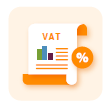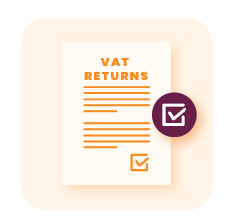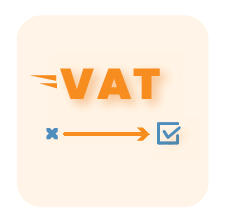VAT in Austria
Originating from the Value Added Tax Act of 1994, the Austrian VAT system was put into effect on January 1, 1995. Concurrently, the Single Market Regulations were enacted in alignment with the VAT Act, ensuring harmonization with the broader EU VAT system.
The Ministry of Finance and the tax authorities, known as Finanzämter, are responsible for the administration of the Austrian VAT system. They oversee the registration of businesses for VAT, the collection of VAT, and the enforcement of VAT regulations. They also provide guidance and support to businesses to help them comply with VAT requirements and avoid penalties.
Selling in Austria?
Scope of Taxation
The following transactions are subject to VAT:
- The supply of goods or services within Austria by a taxable person, encompassing intangible assets and selected immovable properties (the latter being taxed at a reduced rate).
- The acquisition of goods by a taxable person from another EU Member State, referred to as intra-Community procurement.
- Transactions involving reverse-charge supplies, inclusive of both services and goods necessitating installation.
- A taxable person’s self-supply of goods and services.
- Importation of goods from non-EU countries, applicable to importers of any status
Taxable persons include:
- Individuals and legal entities engaged in economic activities.
- Non-commercial organizations, like public bodies, conducting economically valuable commercial activities.
Austria – General VAT information
| Tax Authority | Austrian Ministry of Finance |
| VAT in local language | Umsatzsteuer (USt) /Mehrwertsteuer (MwSt) |
| Currency | € Euro |
| VAT number format | AT+9 characters; The first character is always “U”. |
| ATU12345678 | |
| VAT rates
|
Standard 20%, 19%; Intermediate 13%; Reduced 10%, 5% |
| Zero-rated (0%) and exempt | |
| Thresholds | |
| Registration | |
| Established | EUR 35,000 |
| Non-established | None |
| Intra-EU Distance sales and electronically supplied services to consumers (OSS) | EUR 10,000 |
| VAT Group | While in other EU countries Grouping is not required in Austria it is mandatory under Section 2(2) of the VAT Act. |
| Voluntary Registration | Applicable when a VAT identification number (VAT ID) is necessary to conduct certain transactions, and exempt business must disclose the reason for such registration. |
| Intra-Community supplies | EUR 100,000 |
| Intra-EU Dispatches/Arrivals | EUR 750,000 |
| Recovery of VAT by non-established businesses | Yes |
| Compliance Returns and Deadlines | |
| VAT Returns | 15th day of the second month following the end of the period |
| Frequency | Monthly, quarterly, and Annual Returns
|
| European Sales Listing | End of the month following the end of the period |
| Intrastat | 10th day following the end of the period |
| Annual Return | On or before April 30 of the following calendar year if filed on paper or on or before June 30 of the following calendar year in case of electronic filing |
| Electronic Invoicing | While electronic invoicing is not compulsory in Austria, it is generally mandatory for business-to-government (B2G) transactions. However, businesses have the option to use e-invoicing voluntarily. |
Last Updated: 11/10/2023
Disclaimer
The information provided by Global VAT Compliance B.V. on this webpage is intended for general informational purposes only. Global VAT Compliance B.V. is not responsible for the accuracy of the information on these pages, and cannot be held liable for claims or losses deriving from the use of this information. If you wish to receive VAT related information please contact our experts at support@gvc.tax








